The Communist Working Circle, (CWC) “Kommunistisk Arbejdskreds”, (KAK) was formed in 1963, when a small group of people, including Gotfred Appel, were either excluded from the Danish Communist Party or left it because they concurred in the criticism of Soviet domestic and foreign policy by the Communist Party of China, and thereby in the criticism of “modern revisionism”. The new group launched a publishing house, Futura, and secured the rights to translate and publish Chinese materials in the Danish language. In September 1967 Maoist youth broke from the Communist Party of Denmark’s youth mass organization and the KAK was able to form a youth-wing called the KUF in 1968.

CWC’s originally warm and close relations with the Communist Party of China were severed in 1969, because the CWC insisted on pursuing a discussion on what it saw as the connection between Liu Shao-chi’s political line and the Comintern’s line as it had been promoted in Europe, and because the CWC publicly proclaimed its profound disagreement with the Chinese evaluation of what they termed “an unpredecentedly gigantic revolutionary mass movement” amongst the workers of Western Europe and North America during 1968.
As a result of this dispute, pro-China Maoists left the CWC and formed the Communist League (Marxist-Leninist) KF (M-L).
After several years of theoretical struggle and as a result of practical work in support of Vietnam and the Palestinian struggle, the CWC developed its “theory of the parasite state”. It was CWC’s view that the working class in the developed countries of Western Europe and North America occupied a two-fold position. It was at one and the same time exploited (in so far as it produced surplus value) and bribed (in so far as its standard of living and hence its economic (and cultural) needs and its “trade union” demands were based on decades of sharing in the imperialist world’s former colonial, now “neo-colonial” plunder). Furthermore, the theory held that the bribery factor was the dominant of the two.
The CWC promulgated this view in a number of books and pamphlets and in a journal, “Communist Orientation”. Support for liberation movements around the world became a chief focus of its pratical activity.
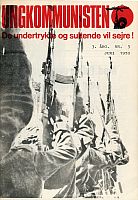
Inspired by the American/Canadian solidarity group, Liberation Support Movement (LSM), the CWC started an organization called Clothes to Africa. They collected used clothes that were sent to liberation movements in southern Africa, and later they organized flea markets to raise additional money.
Meanwhile, the KUF’s mass work led it to engage in a series of violent demonstrations in 1968-1970. In 1970 CWC members received military training from the Popular Front for the Liberation of Palestine (PFLP) in Jordan and Lebanon. In 1972 the CWC started its own version of urban guerrilla warfare by raiding a Danish police post, capturing the weapons there, and then proceeding to commit robberies to raise money for arms for the PFLP.
In 1978 the CWC expelled Appel who legally retained the organization’s name. The remaining members of the organization took a new name, Communist Work Group (KA). They continued to study and do solidarity work in Clothes to Africa. They also continued conducting robberies in support of the PFLP. In November 1988 KA members undertook a robbery in the center of Copenhagen resulting in a shoot-out with the police in which one officer was killed. Thereafter, a number of members of KA were arrested and served time in prison.
Appel himself continued to be active in revolutionary politics, publishing the journal Communist Orientation until 1980, and writing articles in support of Chinese foreign policy, the Theory of Three Worlds, and the Chinese contention that the Soviet Union was the most dangerous and aggressive of the two superpowers. He died in 1992.
Theorists and Thieves [book review of Turning Money into Rebellion: The Unlikely Story of Denmark’s Revolutionary Bank Robbers] by Dhruv Jain
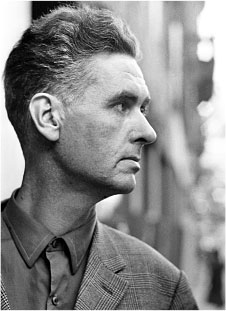
A Fraternal Organ of Rote Fahne in Denmark
Revisionism In Trouble by Gotfred Appel
Letter to Central Committee of the Communist Party of China
Letter to Embassy of the People’s Republic of China, Copenhagen
There Will Come a Day... Imperialism and the Working Class by Gotfred Appel
Class Struggle and Revolutionary Situation by Gotfred Appel
The Devious Roads of the Revolution by Gotfred Appel
The Principal Contradiction (2)
Denmark: Robbing for the Revolution?
The Communist Workers Party of Demark (KAP)(sometimes translated as the Communist Labor Party of Denmark) had its origins in two sources. First, the Socialist Left, a dissident group that had split off from the Socialist People’s Party, which was itself a split off from the Communist Party of Denmark in the late 1950s. Second the Communist Working Circle, an anti-revisionist group which began in 1963, but which broke with China in the late 1960s.

The KAP began in 1968 as the Communist League (Marxist-Leninist) (KFML). It published a journal called Communist. The League called for the formation of an anti-revisionist communist party guided by Marxism-Leninism-Mao Tsetung Thought.
Almost immediately, however, the group was torn by disputes over Stalin’s historical legacy. A majority supported the Chinese line that Stalin had been a great revolutionary, but had made significant mistakes. The minority supported Stalin unconditionally. The majority ultimately prevailed, but a great many members resigned and the group was reduced to a small study circle.
Notwithstanding this setback the KFML survived and grew slowly. In 1971 it merged with a youth group, Communist Youth (Marxist-Leninist). In 1975, after several years of rivalry with another anti-revisionist group, the Marxist-Leninist Unity Confederation, the latter split and many members joined the KFML. It now had a membership of several hundred and cells across the country.
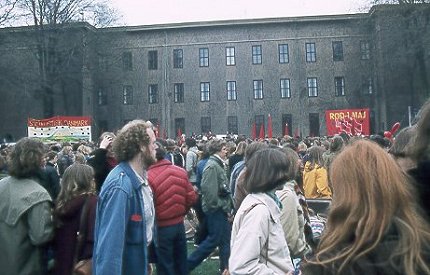
The KFML became very active in the Danish labor movement after 1975, in the shipyards and among postal workers and teachers. It began publication of a newspaper Arbejder Avisen (Workers’ Voice) while the Communist was renamed Communist Journal. A publishing house, ’October’ was started which issued an extensive set of pamphlets and books.
During 1976, the transformation of the League into a Party was put on the agenda, starting with the adoption of a new party program to replace the old one from 1970. This program was the subject of extensive discussion during the summer and fall of that year. It won the support of the overwhelming majority of the members, and in November 1976, at the founding congress of the Communist Workers Party (KAP), the program was adopted.
In 1979 the KAP actively participated in national elections, anticipating receiving sufficient votes (2%) to secure a seat in parliament. The results, however, were disappointing as the party secured only 13,000 votes, or less than one-half of one percent of the vote.
The KAP had always been an orthodox Maoist Party. Even after the defeat of the “Gang of Four” it maintained its pro-China allegiance. However, by 1980 the KAP could no longer ignore Chinese developments. The crushing of the democracy movement in 1979 and Deng Xiaoping’s return to power called into question KAP’s Maoist orientation.
In the spring of 1980 the KAP leadership launched a political and ideological reorientation of the organization. The new line still held to Mao Zedong-Thought, but it sought a certain distance from China, and set the stage for the KAP to develop its own ideas about how socialism could be constructed in a highly developed capitalist society like Denmark. The new slogan was ’Danish socialism’.
On the one hand, the new line was welcomed by many members as a much-needed step; on the other hand, it led to the first major internal conflict in the organization since 1970. The debate on line, however, was soon eclipsed by a controversy over inner-party democracy.
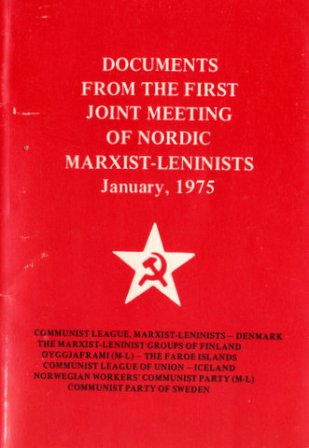
Many members across the country, but especially in the city of Aarhus, raised harsh criticisms of the leadership style of the party. The Central Committee and especially the Executive Committee, were accused an authoritarianism and a dictatorial style of leadership. Critics described the KAP as centralist without democracy. These charges were made in the Party’s internal magazine, and at membership meetings and conferences.
The resulting turmoil in the organization led to the resignation of close to half of the party members during 1980-81. The dissidents attempted to form a new organization, but they could not agree among themselves and this attempt came to nothing.
The KAP’s weakness was highlighted in the general election in 1981. It was once again managed to gather enough signatures to qualify to run candidates, but it secured just over 4,000 votes.
From this point forward the KAP suffered a steady decline. At the beginning of the 1980s it had almost 1,000 members; ten years later, no more than about 100. The Party was dissolved in 1994.
Statement of the Communist Party of Kampuchea [CPK] to the Communist Workers’ Party of Denmark, July 1978 by Nuon Chea
Death of Comrade Frede Klitgård
Social-Imperialism Plunders India from Peking Review, #40, October 4, 1974
Documents from the First Joint Meeting of Nordic Marxist-Leninists, January 1975
Message From Chairman Benito Scocozza of Communist League Marxist-Leninists of Denmark [on the death of Mao] from Peking Review, #40, September 30, 1976
Communist Labor Party of Denmark Founded
Second National Conference of the Party-Building Communist Organization October of Denmark
Communiqué of the Founding Congress of the Workers’ Communist Party of Denmark (APK)
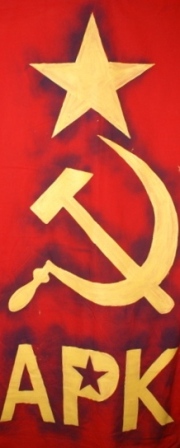
The Manifesto for a Socialist Denmark [Adopted as the general programme of the Party at its Founding Congress, held in Copenhagen from the 20th to the 23rd of April 2000]
All Together against Capital [adopted as the programme of action of the Party at its Founding Congress]
Statutes of the Workers’ Communist Party of Denmark (APK)
Europe, “the Nordic Model” and the Revolution [Contribution of the APK to the Fourth International Seminar “Problems of the Revolution in Latin America”, held July 17-21, 2000, in Quito, Ecuador]
For a Class-based Line of Trade Unionism [Speech delivered by Dorte Grenaa, chairman of the Workers’ Communist Party of Denmark (APK), on behalf of the Danish delegation attending the 7th International Meeting of Trade Unionists, June 22-24, 2001, in Bourges, France]
How Can the Working Class Women Strengthen Their Struggle in the Trade Unions? [Intervention by Dorte Grenaa, chairman of the Workers’ Communist Party of Denmark (APK), at the 7th International Meeting of Trade Unionists, June 22-24, 2001, in Bourges, France]
Party of Labour of Albania Message to 2nd Congress of Communist Party of Denmark (ML)